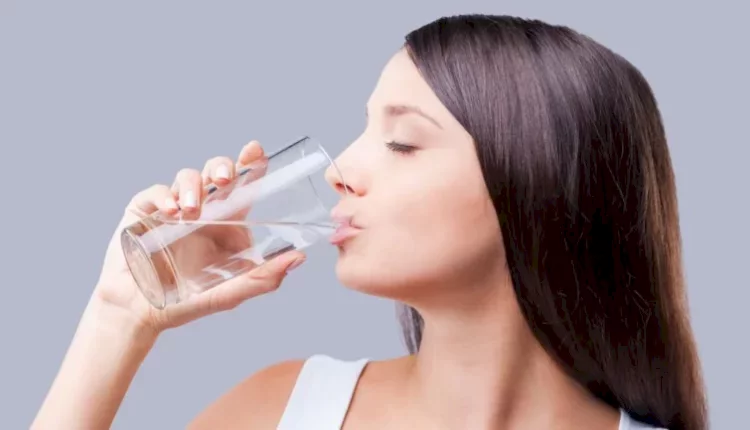
How Long Does The Water You Drink Stay In Your Body? And How Do You Lose It?
SadaNews - Water makes up more than half of your body, and it is vital for regulating temperature, blood circulation, joint flexibility, and waste elimination. After drinking water, it enters your blood cells within 5 minutes and is fully absorbed into the bloodstream within two hours, according to "Verywell Health."
The kidneys remove most of the water you drink from your body, purifying the blood and eliminating any waste, including excess water, through urine.
Small amounts of water are also lost through your skin via sweat, your lungs through breathing, and your colon (through stool).
The natural antidiuretic hormone "Arginine vasopressin" (AVP), along with the thirst response, helps maintain water balance in your body.
If the body loses more water than you consume, your body will retain the water you drink and reduce the amount of urine it produces. Conversely, if you drink more than you need, your body will quickly eliminate it through urine or other processes to maintain its natural balance.
Factors Affecting How Long Water Remains in Your Body
Your body’s ability to expel water is influenced by several factors, including:
Source of Water
The body expels tap water quickly, whereas other beverages like lemonade or sports drinks may take longer to eliminate.
Age
Children and teenagers lose water faster due to increased activity of sweat glands and rapid breathing. In contrast, the elderly may be more prone to dehydration due to declining kidney function, reduced thirst response, memory issues, and other age-related changes.
Sweating
Exercising and being in hot or humid environments leads to rapid water loss from the body.
Physical Activity
Athletes and individuals engaged in physical work lose more water than those who lead a sedentary lifestyle.
Kidney Function
If your kidneys are not functioning properly, your body will eliminate water less efficiently. Common causes of impaired kidney function include chronic kidney disease and aging.
Medications
Certain medications such as diuretics, steroids, caffeine, alcohol, laxatives, and some antibiotics or heart medications can increase urination, diarrhea, or sweating, leading to additional water loss.
Nutrition
A high salt intake can cause your body to retain water longer. Aim to limit your sodium intake to no more than 2300 milligrams per day (or 1500 milligrams if recommended by a healthcare provider).
It is advisable to compensate for the water your body loses daily through drinking water and eating foods for optimal health. Women typically lose about 12.7 cups (3 liters) of water daily, while men lose about 14.8 cups (3.5 liters) daily.
Typically, the body gets about 19 - 25 percent of its water requirements (2 - 3 cups) from the foods consumed, such as fruits, vegetables, soups, meats, and other sources.
The need to urinate 5 to 7 times a day is a good sign that you are drinking enough water.
Hidden Water Sources in Your Diet
When thinking about how to stay hydrated, most people consider the water they drink. However, your total daily water intake includes more than that; here are some surprising hydration sources that can help you meet your fluid needs:
Drinking water, including tap water, bottled water, flavored water, and sparkling water.
Other beverages, including milk, tea (including herbal tea), coffee, juice, sports drinks, and plant-based milk (such as almond, oat milk).
Moisture from foods, which can have water content as high as 80 - 90 percent, like soups, stews, fruits (like watermelon, oranges), and vegetables (like cucumber, lettuce, celery), even yogurt.
Frozen and blended foods, such as smoothies, popsicles, and ice cubes. Spices and sauces.
Practical Tips to Stay Hydrated Every Day
Here are some tips to increase your water intake:
Opt for healthy beverages. Plain or sparkling water, regular coffee or tea, vegetable juice, and milk.
Drink water with your snacks and meals to stay hydrated.
Focus on foods and beverages high in water content. The following nutrient-dense foods contain over 90 percent water; melon, watermelon, strawberries, lettuce, spinach, celery, and skim milk. Set reminders throughout the day to remind you to drink water. Alternatively, consider using a water bottle with measurements or a "smart" version linked to an app on your phone to track your daily intake. And of course, be sure to drink more than usual whenever you exercise, during hot weather, and when you are ill.

Scientists Attempt to "Intercept Cancer" Before Its Formation.. Know the Details

American Fact-Checking Platform Exposes Trump's Exaggerations in State of the Union Addres...

How Mourinho Deceived Everyone and Watched the Match Between Real Madrid and Benfica from...

Fat Loss Improves Blood Pressure and Supports Immunity

Galaxy S26 Armed with a Smart Feature to Combat the Most Dangerous Threats to Smartphones

Discovery of Microplastic Particles in 90% of Prostate Cancer Cases

Artificial Intelligence Diagnoses Children's Brain Tumors with 92% Accuracy Without Surger...

